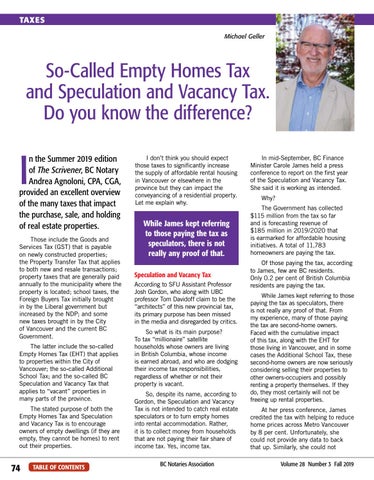TAXES Michael Geller
So-Called Empty Homes Tax and Speculation and Vacancy Tax. Do you know the difference?
I
n the Summer 2019 edition of The Scrivener, BC Notary Andrea Agnoloni, CPA, CGA, provided an excellent overview of the many taxes that impact the purchase, sale, and holding of real estate properties. Those include the Goods and Services Tax (GST) that is payable on newly constructed properties; the Property Transfer Tax that applies to both new and resale transactions; property taxes that are generally paid annually to the municipality where the property is located; school taxes, the Foreign Buyers Tax initially brought in by the Liberal government but increased by the NDP; and some new taxes brought in by the City of Vancouver and the current BC Government. The latter include the so-called Empty Homes Tax (EHT) that applies to properties within the City of Vancouver; the so-called Additional School Tax; and the so-called BC Speculation and Vacancy Tax that applies to “vacant” properties in many parts of the province. The stated purpose of both the Empty Homes Tax and Speculation and Vacancy Tax is to encourage owners of empty dwellings (if they are empty, they cannot be homes) to rent out their properties.
74
TABLE OF CONTENTS
I don’t think you should expect those taxes to significantly increase the supply of affordable rental housing in Vancouver or elsewhere in the province but they can impact the conveyancing of a residential property. Let me explain why.
While James kept referring to those paying the tax as speculators, there is not really any proof of that. Speculation and Vacancy Tax According to SFU Assistant Professor Josh Gordon, who along with UBC professor Tom Davidoff claim to be the “architects” of this new provincial tax, its primary purpose has been missed in the media and disregarded by critics. So what is its main purpose? To tax “millionaire” satellite households whose owners are living in British Columbia, whose income is earned abroad, and who are dodging their income tax responsibilities, regardless of whether or not their property is vacant. So, despite its name, according to Gordon, the Speculation and Vacancy Tax is not intended to catch real estate speculators or to turn empty homes into rental accommodation. Rather, it is to collect money from households that are not paying their fair share of income tax. Yes, income tax. BC Notaries Association
In mid-September, BC Finance Minister Carole James held a press conference to report on the first year of the Speculation and Vacancy Tax. She said it is working as intended. Why? The Government has collected $115 million from the tax so far and is forecasting revenue of $185 million in 2019/2020 that is earmarked for affordable housing initiatives. A total of 11,783 homeowners are paying the tax. Of those paying the tax, according to James, few are BC residents. Only 0.2 per cent of British Columbia residents are paying the tax. While James kept referring to those paying the tax as speculators, there is not really any proof of that. From my experience, many of those paying the tax are second-home owners. Faced with the cumulative impact of this tax, along with the EHT for those living in Vancouver, and in some cases the Additional School Tax, these second-home owners are now seriously considering selling their properties to other owners-occupiers and possibly renting a property themselves. If they do, they most certainly will not be freeing up rental properties. At her press conference, James credited the tax with helping to reduce home prices across Metro Vancouver by 8 per cent. Unfortunately, she could not provide any data to back that up. Similarly, she could not Volume 28 Number 3 Fall 2019
